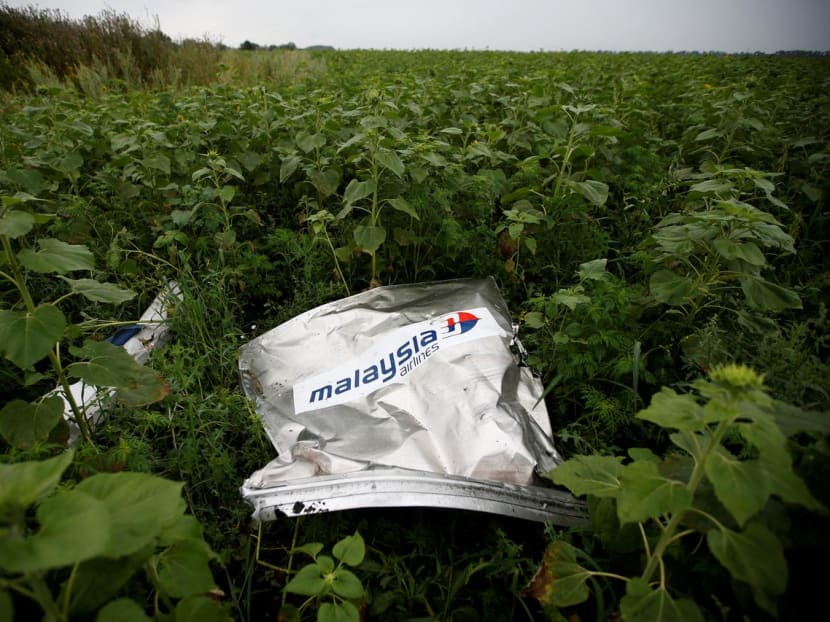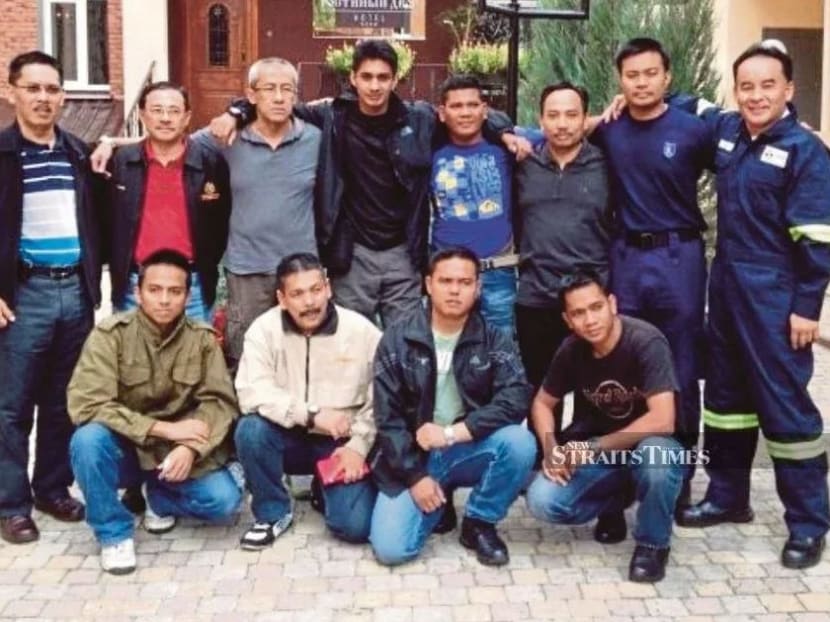'We were willing to die to bring back MH17's black boxes', says M'sian covert team commander
KUALA LUMPUR — Recovering the black boxes of downed Malaysia Airlines Flight MH17 from war-torn eastern Ukraine was a matter of national dignity for the team now nicknamed the “Dozen Persons”.

MH17 was shot down on July 17, 2014 en route to Kuala Lumpur from Amsterdam, killing all 283 passengers and 15 crew on board.
KUALA LUMPUR — Recovering the black boxes of downed Malaysia Airlines Flight MH17 from war-torn eastern Ukraine was a matter of national dignity for the team now nicknamed the “Dozen Persons”.
“I promised the then prime minister (Datuk Seri Najib Razak) that we’d bring back the black boxes, even if we needed to sacrifice our lives. It was to restore the nation’s dignity,” said Colonel Mohd Sakri Hussin.
Mr Sakri was the commander of the Dozen Persons, the team that was tasked with entering eastern Ukraine covertly to secure the two black boxes of the Boeing 777-200ER and the bodies of the victims following the tragedy on July 17, 2014.
“The PM told me that this was a mission to restore the nation’s dignity. We had lost MH370 only months ago, and now another flight was shot down.
“If the country couldn’t retrieve the black boxes, we would seem weak. So, I told my men that no matter what happened to us, we would make sure the black boxes were retrieved. We were doing it for the country,” he told the New Straits Times recently.
MH17 was shot down en route to Kuala Lumpur from Amsterdam, killing all 283 passengers and 15 crew on board.

Mr Sakri said even though the mission took place five years ago, it was still fresh in his mind.
He said the operation was the most challenging one in his career.
“We had no firearms. We went in empty. All we had were some money (to rent a car), food and medication to pull off the covert operation.
“I joined the armed forces in 1981. I was involved in the Communist Insurgency. When we faced the communists, we could always go in a group and plan the operation.
“This (MH17) operation, we could also plan, but it was different as the rebels could find us, could easily attack us with artillery and we could be gone in a split second,” he said.
Mr Sakri, now senior deputy director (operations department) with the National Disaster Management Agency, said the National Security Council initiated a plan once they learnt about the downing of MH17.
“I was National Security Council principal assistant secretary in 2014. Soon after we learnt MH17 was shot down in Ukraine, the council assembled, called up all relevant agencies and gave assistance on how to proceed with the operation.
“Most arrangements were made by the Department of Civil Aviation (DCA) (now Civil Aviation Authority of Malaysia), but as the agency responsible for security, the council decided to send a team to the crash site as fast as possible.”
He said the team of 115 people departed for the Ukrainian capital of Kiev on July 20 and were warned by the ambassador not to take any action without the permission of the Ukrainian government.
“During the briefing with the ambassador at the hotel (in Kiev), I received a call from my boss stating that the PM wanted to talk to me. The PM told me to initiate a covert mission, a special operation to establish contact with (Ukrainian separatist leader Alexander) Borodai. He gave me two numbers and asked me to contact them.
“After the call with the PM, I dialled one of the numbers given, and because Borodai couldn’t speak English, he passed the phone to his chief of security Sergei (Kavtaradze), who I had the preliminary negotiation with.”
Mr Sakri said he picked 11 men to accompany him to meet the separatists in Donetsk.
The men included armed forces doctors Brigadier-General Datuk Dr Mohd Ilham Haron and Major Dr Mohd Hafizi Abdullah; Kuala Lumpur Hospital pathologist Datuk Dr Mohd Shah Mahmood; and Royal Malaysian Air Force commandos Major Nazri Musman, Major Muhammad Mustafa Omar, Sergeant Shahrizal Abu Bakar, Corporal Rosli Mustafa and Lance Corporal Mohd Afendy Ahmad Zaini.
Also in the team were interpreter Captain Dr Mohd Zainizam Zainal, Special Malaysia Disaster Assistance and Rescue Team member Inspector Abd Rahim Abd Aziz and communications expert Rosli Shaari.
Mr Sakri said the Dozen Persons team left Kiev for Kharkiv in two vans, arriving six hours later, after spending an hour at a checkpoint manned by Ukrainian police.
After a short rest, the team continued on to Donetsk, where the separatists’ headquarters were.
“It took us four hours to make the 140km journey as we had to go through 10 checkpoints guarded by the military. There were two tanks at every checkpoint which were at the ready while we were questioned by soldiers.”
He said the situation at the second last checkpoint was especially tense as the team was held and their passports were seized by soldiers.
“We were all on visitor’s visas. The questions they asked were simple: What’s the purpose of the journey? Have we obtained permission from the government?
“We answered every question honestly and did not try to hide anything.
“We regarded it as a test of our faith from Allah. We did our best and left the rest in God’s hands.”
After finally passing through all the checkpoints, the team arrived at the separatists’ headquarters and immediately began negotiations for MH17’s voice and flight data recorders, the return of all the bodies of the victims, which the rebels had collected and kept in refrigerated train wagons, and for investigators to be allowed to enter the crash site.
“We were constantly communicating with the PM throughout the journey as he was worried. During the conversation with Borodai, I connected him with the PM. The PM thanked Borodai for his cooperation.
“They agreed to all of our requests, but asked for time to complete the documentation process.”
At a press conference later, which was aired live internationally, the recorders were handed over to Mr Sakri, who passed it over to Mr Mustafa, a Royal Malaysian Air Force commando.
Mr Sakri said the black boxes were then kept in a backpack that never left Mustafa’s side.
The wagons carrying the victims’ bodies were later hooked up to a train in nearby Torez and drawn to Kharkiv, arriving seven hours later.
“The train moved very slowly. We could hear lots of interference and movements, even people jumping onto the train throughout the journey. I made sure that all my men were with me and told them we needed to stick together, even after we arrived at the railway station (in Kharkiv).
“When we arrived at the station, the Ukrainian government announced that Malaysia could keep the black boxes.”
In Kharkiv, a United States Federal Bureau of Investigation agent approached Mr Sakri, asking for the black boxes.
“I told him off, saying that they belonged to Malaysia. Then, three legal officers from the Ukrainian government approached us.
“They told us that we violated their laws and that action could be taken against us. I thanked them for the information and told them that regardless of what they did to us, whether they arrested us or killed us, I was not going to hand over the black boxes.”
Mr Sakri said the black boxes were ultimately handed over to the then DCA director-general Datuk Seri Azharuddin Abdul Rahman, who then flew to Farnborough, near London, under the strict control of Malaysian and Dutch security forces for the investigation. NEW STRAITS TIMES









